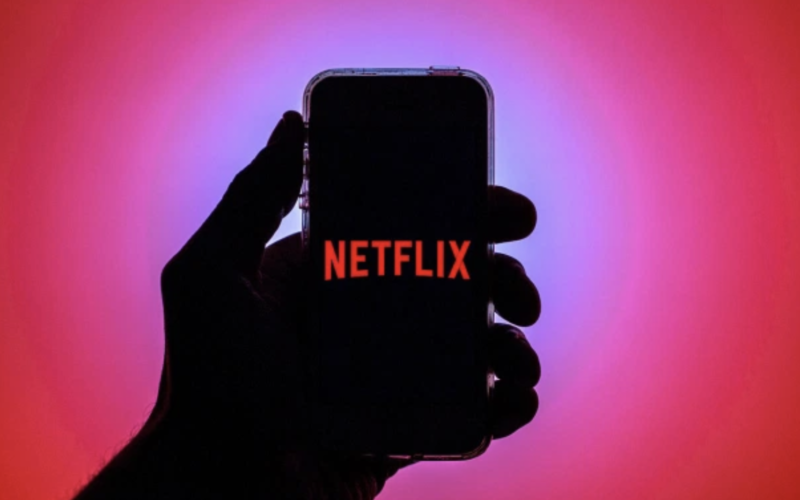BY ALEX WEPRIN, J. CLARA CHAN | HollywoodReporter.Com
Troy Warren for CNT
Forays into games, podcasts and TikTok-like shorts suggest the streaming giant is thinking about new ways to present content beyond TV screens.
Despite its reputation as the king of subscription streaming video, Netflix understands it has never had the dominance on mobile devices that it has on TV screens.
When a subscriber plops down on the couch and opens the Netflix app on their TV, they are welcomed with an array of content the service thinks they will want to binge-watch. On mobile, when a user may only have 30 seconds or a minute or two to check their phone, a two-hour movie simply isn’t the right recommendation.
So, the company is looking to change that narrative.
“As we improve our service, our goal is to continue to increase our share of screen time in the US and around the world,” the company wrote in its Q2 earnings report.
Screen time, not TV time.
Of course people do watch Netflix shows and movies on their phones, but as the company noted in its earnings letter, “we believe our share of engagement is even lower” on mobile than it is on TV screens, and according to Nielsen Netflix accounts for only 7 percent of TV viewing. It’s why Netflix says it competes with YouTube, TikTok and Fortnite more than it does with HBO and Disney+. User time is not infinite — they can only be looking at one screen at a time — and Netflix wants to gobble up as much of that time as possible.
And so, Netflix will enter the gaming space, “primarily focused” on mobile devices at the start.
“We think mobile is a great platform for games,” Netflix product chief Greg Peters said on the company’s earnings call. “Clearly, it’s very mature, it’s got great enabling technology, great tools, a great developer community. And the vast majority of our members have phones that are capable of a great gameplay experience, which sort of checks all of those boxes.”
When viewed alongside its ongoing push into original podcasts, and the recent launch of “Fast Laughs,” which combines the addictive TikTok mobile video format with clips from Netflix’s comedy specials, things begin to become clearer.
When a subscriber opens their Netflix app on their iPhone, the company wants to serve them a mobile-first menu of content options that rivals the movies and TV shows it features prominently on the TV glass.
Mobile is inherently a different beast than TV. Dominated by TikTok, Instagram, Spotify, Snap, Twitter and gaming apps, it isn’t beholden to one format, with games, podcasts, text and video all sharing screen space.
To put it another way, Netflix is betting that Quibi’s basic underlying philosophy was both right and totally wrong: Subscribers want and need different types of content when they are on a train, waiting in line at the store or sitting in a doctor’s office waiting room.
But simply making premium content shorter isn’t enough to feed that itch; market share in mobile requires more than just shorter videos, it needs to have a mobile-first, holistic mindset.
“The reason we’re doing them is to help the subscription service grow and be more important in people’s lives,” co-CEO Reed Hastings said on the earnings call. “So, I would say, really, we’re a one-product company with a bunch of supporting elements that help that product give incredible satisfaction for consumers and a monetizing engine for investors.”
In other words, a fresh mobile experience, led by games, might be just the thing to keep Netflix growing in markets like North America where its subscription levels are nearing saturation, and making the service an even better value for its users.
Gaming could also give Netflix optionality, by offering a less expensive “base tier” without games, or a more premium offering down the line. Just as Netflix offers mobile-only tiers in some countries, games and other formats could expand that experimentation further.
“We view Netflix’s approach to gaming as a potential long-term revenue driver, particularly in mature markets,” wrote Guggenheim’s Michael Morris. “We also believe this strategy supports Netflix’s content flywheel and ultimately diversifies revenue streams.”
But in the near future, Hastings said Netflix isn’t expecting to rely on games or any of its other mobile-first offerings to make the company money. “They’re not a profit pool of any material size on their own,” Hastings said on the earnings call.
Netflix’s ambitions are more modest than competitors from Google, Apple and Microsoft, all of which have launched richly funded and well-stocked mobile gaming subscription offerings.
But Netflix also has the benefit of being a beloved brand, a place where users expect to be shown content relevant to them, and being the home to popular IP like Bridgerton, Stranger Things and The Queen’s Gambit. And the app has no advertising or add-ons, both of which are common in the gaming space but an annoyance to users.
“This could prove attractive to developers as well as consumers,” wrote Tim Nollen of Macquarie Research after the earnings announcement. The company agrees.
“We’re finding that many game developers really like that concept and that focus and this idea of being able to put all of their creative energy into just great gameplay and not having to worry about the other considerations that they have typically had to trade off with just making compelling games,” Peters said.
Netflix’s gaming ambitions have been a long time coming, with Hastings saying that “we talked about video games for several years, writing up the pros and cons of the timing of entry.”
Ultimately, “it came down to us thinking that the incremental money to fund games made sense relative to our other content investments,” he added.
But it is also a major risk for Netflix, which for years has been a Wall Street darling thanks to its insatiable growth. Games are expensive and complex, and there remain real questions about how it plans to deliver those games to consumers (will they stream, or require downloads?).
Morningstar analyst Neil Macker wrote that the effort is a “distraction at best,” while Wedbush’s Michael Pachter wrote that “the business graveyard is littered with the corpses of content companies that have failed at making mobile games, with Disney the most prominent failure. Even video game publishers like Activision, EA, Take-Two, Ubisoft and Nintendo have tried for years to create compelling mobile content, and each has had lasting success only through acquisition.”
Of course an acquisition would not be out of the question for Netflix. Even as the company says that they “don’t view any assets as ‘must-have’ and we haven’t yet found any large-scale ones to be sufficiently compelling to act upon,” an entirely new content area like gaming could open the door to an acquisition of a small studio or other game-focused tech company…provided the company’s money isn’t better spent elsewhere.
In Other NEWS



































